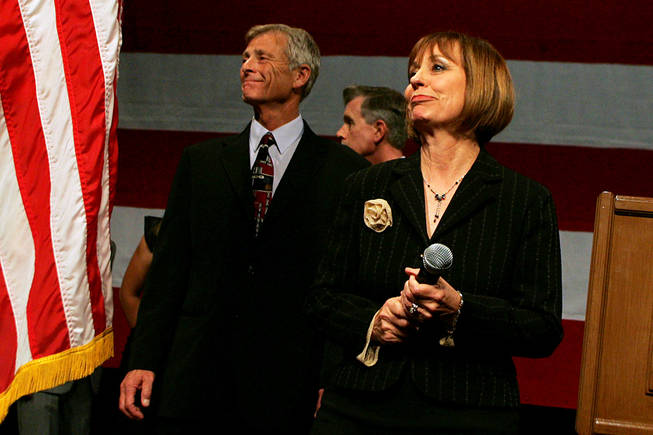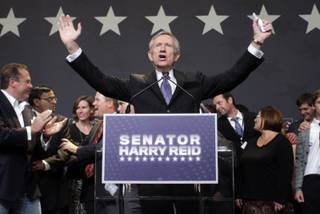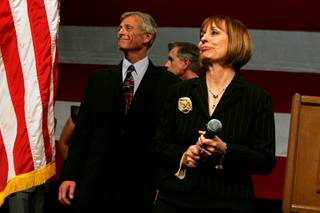
Sam Morris / Las Vegas Sun
Sharron Angle arrives with her husband, Ted, to give her concession speech at the Republicans’ election-night party early Wednesday at the Venetian.
Friday, Nov. 5, 2010 | 2 a.m.
Sharron Angle, the vanquished Republican challenger to Sen. Harry Reid, depicted herself in her brochures as a conservative warrior, driving her old pickup truck, brandishing a firearm. She picked up the Tea Party flag and waved it and then used the flagpole to stick the Nevada establishment in the eye. Although Angle lives in suburban Reno, her most fervent followers reside in the mostly white, rural counties.
In a year when Republicans, including deeply conservative ones, won all over the country, Angle lost, even though Reid was a candidate whose approval ratings sat in the doldrums below 50 percent for years.
Quite simply, Nevada is not the state Angle thought it is, or would like it to be.
Note the Angle profile: anti-establishment, white, (quasi) rural, ultraconservative.
In her defeat, and in her profile, we can see the important factors influencing Nevada’s political climate. Some are long-standing characteristics. Other factors are newer and have been developing only recently, but will almost certainly continue, perhaps at an accelerated pace.
1. A powerfully entrenched establishment that is bipartisan, or, rather, unipartisan.
“The Establishment won. At the end of the day, that’s who won,” UNLV political scientist David Damore said. As a one-industry town, Las Vegas has just a few players who need care and feeding, and no one is closer to those players, whether Democrat or Republican, than Reid. His backers included the Culinary Union, but also MGM Resorts International’s Republican CEO Jim Murren. Reid has also spent years cultivating the mining industry, which considers him a bulwark against Eastern environmentalists and new taxes at the state Legislature.
For years, decades actually, Reid has done favors for these Establishment players, and the favors came back.
“They were in whole hog with him,” said Robert Lang, director of Brookings Mountain West. “Business here sees him for what he is — a transactional politician. And it’s a transactional town. And I say these things in a positive sense.”
The power of the Establishment showed itself in other races, as well. Although Reid’s son Rory ran for governor, his father’s camp didn’t want him running, and his Republican opponent Brian Sandoval managed, oddly, to become even more Establishment than the senator’s son. Sandoval has been a gaming regulator and represented shareholders for the big electric utility.
At the center of this influence is R&R Partners, the advertising and public affairs firm that gave the world “What happens here, stays here.” Its CEO, Billy Vassiliadis, was a chief adviser to Reid. The firm’s top lobbyist, Republican Pete Ernaut, recruited Sandoval to run.
Angle had hoped the conservative grass roots could elect her, just as the liberal grass roots hoped they could transform the state’s politics after the 2008 election. Both were delusional.
2. Over the long haul, demographics are destiny. Minorities make up 31 percent of the population. Hispanics constituted 15 percent of the electorate, and 68 percent of them backed Reid, according to CNN exit polling.
“If you pay attention to demographic trends, you can win a close election,” said William Frey, a Brookings Institution demographer.
Angle, who used TV ads that many Hispanics considered racist, helped Reid mightily with this tone deafness.
Given current birthrates, the state will become more diverse. Lang said Southern Nevada is becoming like a “quasi-Southern California.”
Republicans ignore these trends and continue their vituperative rhetoric at their long-term peril. “Let me introduce you to the Whig and Know Nothing parties from the mid-19th century,” Lang said. “You dance with the Know Nothings into oblivion.”
But Democrats must be attuned to any sense among the burgeoning population of Hispanics that they are being used or taken for granted by politicians.
The trend also presents a challenge to city fathers trying to stitch together a cohesive civic fabric: As the Sun reported in 2006, a key political dynamic that will play out in the coming years will be the tension between older white voters — many of whom are transplants and put their children through school in some state in the East -- having to pay taxes to support schools for minority children.
In this age of extreme austerity, it could make for ugly politics.
Lang said older Nevadans need to be convinced that putting money into schools will make young minorities more productive, which in turn will help them pay the Social Security and Medicare costs of the aged.
Not an easy sell.
3. The cities rule. Washoe County, where Reno sits, backed Reid, just as it backed President Barack Obama in 2008. In both cases the state’s second largest county joined the biggest, making the rest of the state irrelevant.
Nevada is now thoroughly urban, paradoxically the most urban in the country despite its desert sprawl, and urban interests will dominate the state’s future.
“If you can appeal to urban Nevada,” Lang said, “including the moderately conservative areas, then you win.”
For decades, North vs. South has dominated the state’s political dynamic, and that will continue on some issues such as water and political representation in Carson City. But on other issues, the two cities will be bound together, seeking to use their political influence to meet the needs of their urban dwellers.
4. Truly purple and never more important.
Reid won. But so did Republican Sandoval. Democratic Rep. Dina Titus lost narrowly to Joe Heck, but Democratic constitutional officers won. Republicans picked up a few seats in the Legislature, but didn’t enjoy the wave effect of Republicans elsewhere. In retrospect, Angle, the rabid conservative, could not win statewide.
The state’s bellwether appears to be the Las Vegas Beltway that encircles much of the valley. Democrats won these key suburban precincts in 2008, but Republicans came back strong in 2010. The party that controls the beltway controls Nevada.
With Democrats getting pummeled in the industrial Midwest, expect Obama to pin his hopes on Colorado, New Mexico and Nevada to achieve the necessary 270 electoral votes for re-election. So expect Nevada to be a battleground again in 2012.
Which means we all have just a short holiday from the political ads.



Join the Discussion:
Check this out for a full explanation of our conversion to the LiveFyre commenting system and instructions on how to sign up for an account.
Full comments policy